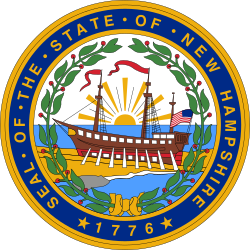February 24, 1976 | |||||||||||||||||||||||||||||||||||||||||||||
| |||||||||||||||||||||||||||||||||||||||||||||
 County results Carter: 20-30% 30-40% 40-50% Udall: 20-30% 30-40% | |||||||||||||||||||||||||||||||||||||||||||||
The 1976 New Hampshire Democratic presidential primary was held on February 24, 1976, in New Hampshire as one of the Democratic Party's statewide nomination contests ahead of the 1976 United States presidential election.






